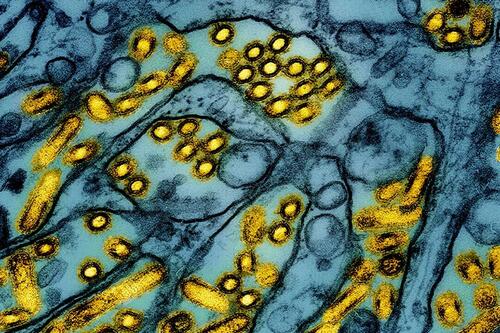
WHO Says Bird Flu Risk Low After 1st H5N1 Death In US
The World Health Organization (WHO) says that the risk from H5N1 avian influenza remains low after the first H5N1 death was recorded in Louisiana on Monday.
 This colorized electron microscope image released by the National Institute of Allergy and Infectious Diseases on March 26, 2024, shows avian influenza A H5N1 virus particles (yellow), grown in Madin-Darby Canine Kidney (MDCK) epithelial cells (blue). CDC/NIAID via AP
This colorized electron microscope image released by the National Institute of Allergy and Infectious Diseases on March 26, 2024, shows avian influenza A H5N1 virus particles (yellow), grown in Madin-Darby Canine Kidney (MDCK) epithelial cells (blue). CDC/NIAID via AP„We are concerned, of course, but we look at the risk to the general population, and … it still remains low,” said WHO spokeswoman Margaret Harris in a statement to reporters at a Geneva press briefing.
When asked if monitoring of the virus was sufficient in the US, she said „They are doing a lot of surveillance. That’s why we’re hearing about it.”
Over 60 people in the US have contracted bird flu since April, most of whom were farm workers and dairy facility employees, after the virus was found circulating among dairy cattle herds and poultry flocks.
The person who died in Louisiana had contracted H5N1 after exposure to wild birds, and a „non-commercial backyard flock,” officials reported, adding that it’s the only confirmed human case of H5N1 in the state.
There has been no recorded person-to-person transmission of the virus, which was first detected in US dairy cattle in March 2024. It has since been confirmed in at least 80 herds in 16 states.
In November, a teen in British Columbia, Canada was hospitalized with a severe case of bird flu.
As the Epoch Times notes further, health officials have stressed that bird flu is still mainly an animal health issue and that the risk to the public remains low.
On Dec. 18, California Gov. Gavin Newsom declared an emergency over H5N1, saying the decision was precautionary and because of cases found in dairy cattle. That declaration followed official confirmation that the Louisiana person who developed bird flu was hospitalized.
Several days ago, the CDC announced that it analyzed samples from the Louisiana case suggesting the H5N1 strain mutated and said that the risk of an outbreak in the United States is still low.
“The detection of a severe human case with genetic changes in a clinical specimen underscores the importance of ongoing genomic surveillance in people and animals, containment of avian influenza outbreaks in dairy cattle and poultry, and prevention measures among people with exposure to infected animals or environments,” the agency said.
Federal and state health officials have recommended people stay away from sick or dead animals, avoid contact with wild birds or domestic birds that appear ill or have died, and refrain from consuming raw milk or products containing raw milk.
Tyler Durden
Wed, 01/08/2025 – 05:45

 2 dni temu
2 dni temu














